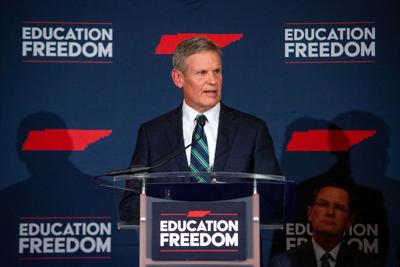
The 2024 legislative session will see more of the controversial education legislation that has helped define Bill Lee’s tenure as governor. Under Lee, Republicans have passed legislation that censors what can be taught in schools, sets strict academic standards, allows certain students to receive private school vouchers and overhauls the state’s education funding formula. While many of these monumental changes are behind us, we may see some backtracking this year, and certainly more substantial bills that will affect students from Memphis to Mountain City.
Leading the Tennessee Department of Education in facilitating these policies is the state’s new education commissioner Lizzette Reynolds, who has already received bipartisan criticism. Reps. Sam McKenzie (D-Knoxville) and John Ray Clemmons (D-Nashville) called on Reynolds to resign after stating she isn’t qualified for her position under Tennessee state law. Sen. Mark Pody (R-Lebanon) called out Reynolds and the TDOE for poor communication amid the rollout of a law that threatens to retain third- and fourth-graders who don’t score high enough on the reading portion of a state test and fail to demonstrate enough growth after receiving specific learning interventions.
The reading law went into effect last year. When lawmakers convened last year, education advocates asked them to roll the law back — they didn’t. Instead, they added benchmark testing so a student’s academic advancement wouldn’t be determined by a single test (though that provision won’t kick in until this year). While just over 1 percent of third-graders were retained last year, many more students could be retained in fourth grade if they don’t show enough growth, as defined by a complicated formula that won’t be officially adopted by the state’s board of education until later this month. Lawmakers may add some additional interventions for fourth-grade students facing retention this year.
“We don’t want to back off on what we’re doing, but we may need to have additional interventions for that fourth-grader — and even that fifth-grader — as they’re moving through the school year.” says Rep. Mark White (R-Memphis), who chairs the House Education Administration Committee.
Perhaps the biggest education topic of this session will concern Gov. Lee’s push for a universal school voucher system. Since Lee announced his desire for such a program in November, several school boards — including those in Jackson and Roane counties and Collierville — have passed resolutions opposing the program. It’s worth watching how Republicans react to the intense scrutiny on this divisive matter and balance the desires of their constituents with those of school-privatization lobbyists.
Familiar bills that fell by the wayside after the Covenant School shooting or that didn’t pass during August’s related special session are likely to resurface this year. One from House Majority Leader William Lamberth (R-Portland) would require schools to develop policies related to how they respond to alarms in the event of active shooters or other emergencies. Another, which has already advanced through one subcommittee as of this writing, would allow teachers to carry guns in private schools that have pre-K programs — a move that some Covenant School parents have opposed. These bills come alongside others aimed at enhancing school safety.
At the end of last year’s session, the future of Tennessee State University was unclear as a comptroller report addressed critical findings from the university, and lawmakers considered reducing the size of TSU’s board of trustees. Since then, TSU president Glenda Glover announced her retirement, and federal leaders indicated that the school has been shorted more than $2 billion in the past 30 years. Whether these developments change lawmakers’ plans regarding TSU remains unclear.
Sen. Raumesh Akbari (D-Memphis) is vice-chair of the Senate Education Committee. She anticipates more legislation targeting diversity, equity and inclusion practices in education, echoing national trends following a Supreme Court ruling that bans affirmative action in higher education.
“We’ll see,” says Akbari. “I’m hoping that some of my colleagues will really get back to the basics of, ‘Can they read? Can they write? Can they count? Can they compete on a national and international level? Are they safe?’ That’s what I want to see, and I think to a certain degree we want [the same] things — but we just have different ideas about how to achieve them.”
State leaders return to Nashville to consider laws related to abortion, education and the ongoing culture wars






